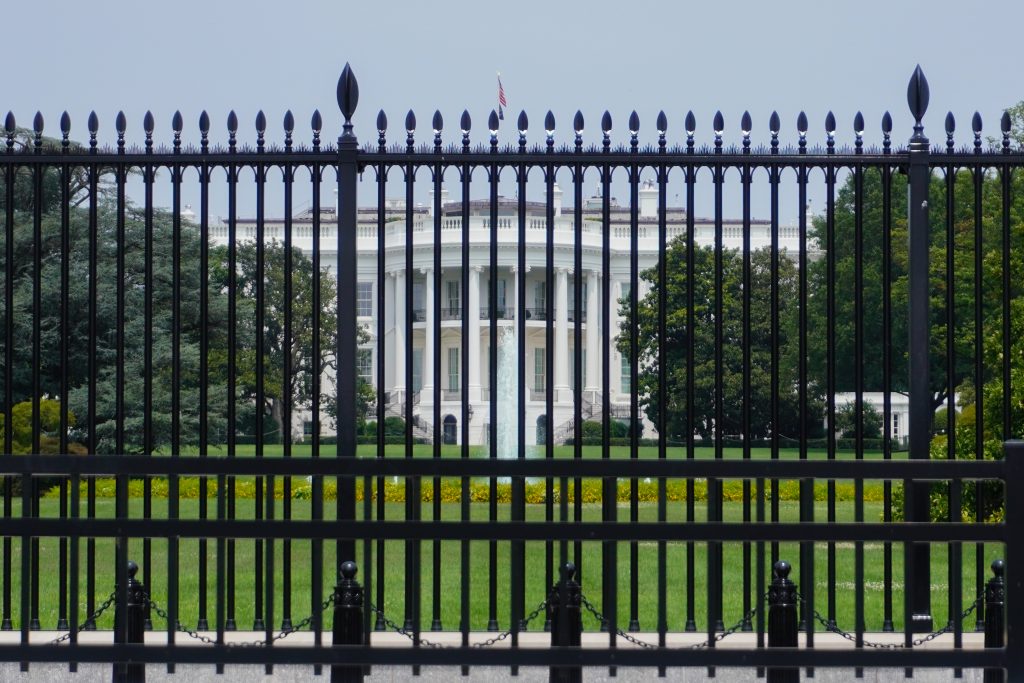President Joe Biden dropped a new executive order this week.
It’s part of his unilateral effort to institute new gun restrictions. But this order is less aggressive than the previous ones. And, with Republicans in control of the House and unlikely to pass anything on his gun agenda, there’s reason to believe the President is now cornered on the issue.
The North Carolina legislature passed a pistol-purchase-permit repeal this week as well. It’s the closest the state has come to getting rid of the Jim-Crow-era law. But, as Contributing Writer Jake Fogleman explains, who blinks in a showdown between a relatively popular Democratic governor and the three lawmakers from his party who voted for repeal will determine whether it gets over the finish line.
Plus, the Heritage Foundation’s Amy Swearer joins the podcast to explain what Biden’s new executive order on guns actually does.

Analysis: Is President Biden Boxed in on Guns? [Member Exclusive]
By Stephen Gutowski
The President released a new executive order on guns this week, but instead of signaling new initiative on the issue, it may show he is reaching the limits of his power.
On Tuesday, the White House announced the President would direct the Attorney General and various federal agencies to implement a variety of reforms. The action included an effort to expand requirements for who must obtain a federal license to sell guns, a request for the Federal Trade Commission to investigate gun advertising, efforts to spread awareness of “red flag” laws, and more. It came in response to a January mass shooting in Monterey Park, California.
President Biden had a simple message in his speech to victims’ families that same day.
“Enough. Do something,” he said. “We remember and mourn today, but I am here with you today to act.”
But the order he produced appears to be far less aggressive than he is projecting and certainly less impactful than his previous gun actions. It also comes as those other orders are staring down oblivion in the courts. And his legislative agenda has already reached the end of the road.
Campaigns to increase awareness of existing laws, like the red-flag initiative, and voluntary requests for reports, like the one on gun marketing, simply don’t compare to attempts to redefine what a firearm is and reclassify pistol-braced guns already owned by millions of Americans as highly-regulated short-barrel rifles. Even the most aggressive aspects of the new order don’t reach the level of President Biden’s previous orders.
Take the vague effort to force more Americans to obtain Federal Firearms Licenses (FFL) for instance. This proposal received top billing from President Biden when announcing the order. He claimed, since FFLs are required to do background checks before all consumer sales, it would get close to making all gun sales subject to FBI checks.
“[M]y executive order directs my Attorney General to take every lawful action possible — possible to move us as close as we can to universal background checks without new legislation,” he said.
But this isn’t the first time a president has pushed for this exact policy. The last administration Joe Biden was part of tried the exact same thing. In 2016, President Barack Obama issued an executive order attempting the exact same thing to little practical effect.
President Biden has a bit more leeway thanks to last year’s Bipartisan Safer Communities Act, which slightly changed the standard for who is “engaged in the business” of dealing guns to those seeking predominantly to profit from their sales. That may embolden the Department of Justice to more aggressively prosecute people who sell guns near the edges of when it could reasonably be considered a business. But federal prosecutors haven’t been very eager to take edge cases to this point, and it’s unlikely they’d be enthusiastic about enormously expanding enforcement.
The same problems affect the President’s push to have the Department of Defense backdoor gun-control requirements into their weapon acquisition programs and get the Federal Trade Commission to investigate gun company marketing.
But even if he succeeds in getting these agencies to take the most aggressive path possible, such as trying to require anyone who makes any profit off a gun sale to obtain an FFL, that will only open up a new set of problems in court. President Biden’s effort to ban the sale of unfinished firearm parts and “ghost gun” kits has already been partially blocked by a Fifth Circuit judge. The judge’s ruling mirrored much of the reasoning used by the full circuit in its decision to strike down the bump stock ban. That puts President Biden’s pistol-brace ban on very unsure footing, given the three rules share the same fundamental legal justifications and weaknesses.
Any effort to overstep the power Congress has granted the administration to regulate gun sales is increasingly unlikely to survive a court challenge. So, President Biden’s new order appears less ambitious on its face, but even if it produces expansive rules, there’s little reason to think those will stick.
That’s probably one reason the President has continued to push for Congress to pass new gun restrictions.
“But let’s be clear: None of this absolves Congress the responsibility — from the responsibility of acting to pass universal background checks, eliminate gun manufacturers’ immunity from liability,” he said in his speech. “And I am determined once again to ban assault weapons and high-capacity magazines. So let’s finish the job. Ban assault weapons. Ban them again. Do it now. Enough. Do something. Do something big.”
Of course, there’s no chance Congress will heed his call. The President couldn’t get any of these policies when his party controlled both houses of Congress. With Republicans now in control of the House, there’s even less reason to think any new gun restriction will make it to his desk.
The President appears to be boxed in on guns now. His rhetoric remains confident, but his actions indicate he understands the restraints he now faces. He has already taken the most aggressive avenues he plausibly could, and those efforts aren’t going to plan. His latest action is more modest, and even if it swerves in the most aggressive direction, its prospects aren’t any brighter than the President’s previous actions.
Podcast: What Does President Biden’s New Executive Order on Guns Do? (Feat. Heritage’s Amy Swearer) [Member Early Access]
By Stephen Gutowski
President Joe Biden announced a set of new executive orders this week that could have wide-ranging effects.
But what does his order actually do? Well, that’s what we brought Amy Swearer on to explain. She’s the conservative Heritage Foundation’s gun policy expert who regularly testifies on Capitol Hill.
She said three of the initiatives have the potential to have a severe impact on gun owners across America. The effort to broaden the requirement for those selling guns to obtain a federal license, the directive that federal agencies and the military try to add gun-control requirements to their gun acquisition contracts, and the request for the Federal Trade Commission to investigate gun company advertising could have the most significant effect. Swearer said those policies could make it much more difficult for private individuals and companies to sell guns.
However, we don’t yet know precisely how the administration will put President Biden’s order into practice. And there are real hurdles to implementing them in the most aggressive possible approach.
When it comes to changing the standard for who qualifies as being “engaged in the business” of dealing guns, the President will have to work within the legal definition set by Congress. The Department of Defense is unlikely to compromise the effectiveness of its weapons to push a backdoor gun-control regime. And the FTC doesn’t have to listen to Biden’s request at all.
Still, Swearer argued he might push the boundaries of what’s possible on all three.
But this order is undoubtedly less substantial than President Biden’s previous executive actions on guns. His ‘ghost gun” and pistol-brace bans affect millions of Americans, potentially subjecting them to federal felon charges if they don’t give up or register their affected firearms and parts.
Of course, those orders are also under intense legal scrutiny. The “ghost gun” rule has already been mostly blocked, and it’s very likely the pistol-brace ban will soon face the same fate. But Swearer said gun owners should remain concerned about where this new order could end up.
Plus, Contributing Writer Jake Fogleman and I discuss North Carolina’s gun advocates’ latest effort to repeal the state’s pistol-purchase-permit law.
You can listen to the show on your favorite podcasting app or by clicking here. Video of the episode is available on our YouTube channel. As always, Reload Members get access to the show on Sunday. Everyone else can listen when it goes public on Monday.
Come on the Podcast
One of the many perks of a Reload membership is the opportunity to appear on the podcast. We’ve had a lot of people on the show from all kinds of backgrounds. It’s one of my favorite segments since it gives us all a better insight into the community that makes this publication possible. If you want to come on the show, just reply to this email and let me know!

Analysis: Will the Votes for North Carolina’s Pistol Purchase Permit Repeal Hold Through a Veto? [Member Exclusive]
By Jake Fogleman
Just because a bill passes with veto-proof majorities doesn’t mean those votes always stick around when it really counts.
Huge majorities in the North Carolina legislature just passed a wide-ranging gun bill that includes a repeal of the state’s 104-year-old law requiring a permit to purchase a handgun. The final vote came on Wednesday when the state House gave its stamp of approval with the support of three Democratic legislators. Those three House Democrats, and whether or not they hold firm in their support for the bill, will determine if repeal makes it across the finish line.
Unlike the state senate, where Republicans now hold a veto-proof majority, North Carolina House Republicans must be able to count on at least one Democratic vote to override a veto from Governor Roy Cooper (D.). And though he hasn’t publicly signaled one way or another what he intends to do with the bill now that it’s on his desk, all signs point to a likely veto.
Cooper vetoed separate bills to repeal the permit-to-purchase law and allow licensed concealed carry during religious services on school grounds back in 2021. Both policies are included in Senate Bill 41, and he hasn’t offered any public comment suggesting his views on either policy have changed.
On paper, supporters of the bill should feel pretty confident in their prospects despite the Governor’s opposition. After all, even if two Democrats defect in the face of a tough veto override vote, the bill can still make it into law, provided everyone else stands firm. However, a recent example from another southern state serves as a cautionary tale that a veto override is no guarantee, even when a bill initially passes with huge margins of support.
In 2021, gun-rights supporters in Louisiana were riding high when the state legislature approved a permitless carry bill. The state’s Democratic Governor, John Bel Edwards, told lawmakers ahead of time that he would veto the measure if and when it made it to his desk, but they were undeterred. During its initial passage, the state House voted for it 73-28, and the Senate voted for it 27-9 —both above the two-thirds margins required to override a veto.
However, multiple lawmakers balked when it came time to take the actual veto override vote. The initial 27-9 margins in the Senate turned into a 23-15 vote when it mattered most, and the override failed. Not only did both Democrats who initially supported the bill change their votes, but three Republicans joined them in defecting as well. Another Republican who voted for it the first time didn’t show up for the override vote.
The experience in Louisiana demonstrates that voting to help pass a bill that would clear the chamber with or without your vote is an entirely different proposition from voting to override a veto issued by a member of your own party. In some cases, apparently, voting to override the opposing party can be equally daunting.
What makes matters more challenging for supporters of SB 41 is that Governor Cooper enjoys relative popularity among the voting public in North Carolina despite the state’s red tilt. His above-average approval ratings make it harder for lawmakers to go against him in a high-profile legislative battle.
The North Carolina GOP’s best hope for a Democrat willing to stand behind Senate Bill 41 likely lies in state Representative Michael Wray (D.). Wray initially co-sponsored a standalone House Bill to repeal the pistol purchase permit requirement, and he voted in favor of Senate Bill 41 when it cleared the legislature.
However, he has also already shown a willingness to cave to political pressure on the policy. He actually voted against his own bill in the House after saying a local sheriff in his district expressed discomfort with the proposal. It’s unclear what changed between then and now to cause him to support repealing the permit-to-purchase law again, but his track record of flip-flopping is not a positive sign for those hoping he stands firm against the Governor.
It’s certainly possible that North Carolina lawmakers will continue to have the votes to make the state’s pistol purchase permit requirement a relic of history. They are closer than they have ever been. But the high-stakes nature of a bipartisan veto override, especially when a hot-button political issue like gun sales is involved, makes the likelihood that a few lawmakers get cold feet that much higher.
That’s it for now.
I’ll talk to you all again soon.
Thanks,
Stephen Gutowski
Founder
The Reload






